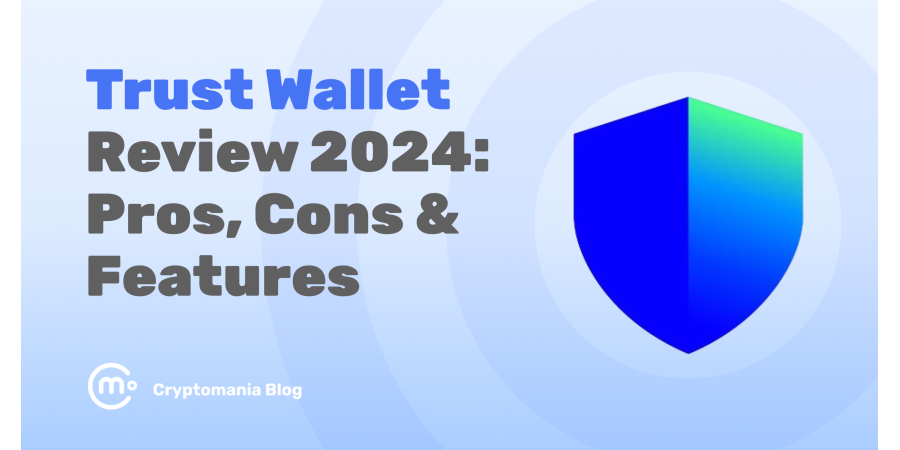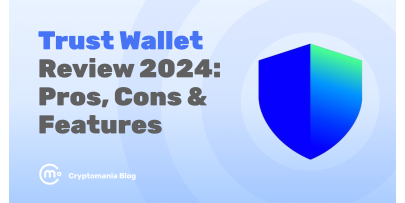

Crypto market is now growing like never before, but so are cyber attacks. Blockchain networks offer stellar security, yet hackers are coming up with ever new ways to get access to your money. This means it’s more important than ever to hold your digital assets in a trustworthy crypto wallet. Trust Wallet is one such safe and feature-rich tool boasting a mesmerizing array of helpful features and functionalities. So how does Trust Wallet work and is it the right option for you?
We dive deep into Trust Wallet’s features, pros, and cons to ensure you have all the information you need to decide wisely!
What is Trust Wallet?
Trust Wallet is a top non-custodial crypto wallet that supports 10+ million assets including the most popular ones like Bitcoin, Ethereum, Solana, Cardano, Polygon, Avalanche, and more across 100+ blockchains.
Trust Wallet was created in 2017 by Ukrainian software developer Viktor Radchenko. Just over a year later, Binance acquired Trust Wallet and expanded its reach. Known for its user-friendly design, strong security features, and support for a wide range of assets, Trust Wallet now has over 80 million users worldwide.
While Trust Wallet was originally conceived only for mobile, it’s now available also as an extension for Brave, Chrome, Opera, Edge, and other popular web browsers, ensuring accessibility for a wide range of users.
Trust Wallet is more than just a place to store your crypto; it also lets you stake coins and earn interest, helping you grow your digital assets.
Let’s look at some of Trust Wallet’s best features and its limitations.
How does Trust Wallet work?
Trust Wallet grants customers the power to safely store, manage, and exchange cryptocurrencies. User control is given first priority, guaranteeing that only you have access to your funds and private keys.
One of the best things about Trust Wallet is its integrated Web3 browser that lets you explore the dynamic world of DApps (decentralized apps) on multiple blockchains. Whether you want to explore DeFi platforms like Uniswap and PancakeSwap or play the latest decentralized games, Trust Wallet ensures all of the tools are right at your fingertips.
Say you’re eager to use a DeFi platform for yield farming. Trust Wallet organizes everything into a single user-friendly interface, saving you from having to juggle numerous apps or add-ons. With only a few taps, you can easily exchange tokens, engage with liquidity pools, and even take part in token launches.
Now, hold your horses just yet… Before you plunge headlong into leveraging Trust Wallet, it’s crucial to take a moment and weigh its pros and cons. For clarity, let’s start with a quick rundown before delving into each aspect in-depth.
| 👍Pros | 👎Cons |
| Non-custodial: Users control their keys | Limited desktop functionality |
| 10+ million assets across 100+ blockchains | Limited customer support |
| User-friendly interface | Does not have two-factor authentication (2FA) |
| Great staking options | Occasional fake currencies & scams |
| No installation or storage fees | Only basic trading tools available |
| Great interoperability with Binance | |
| Open-source technology |
Key features and advantages
So, what are some of Trust Wallet’s best functions that make it a top choice for digital asset management?
Non-custodial wallet. Trust Wallet makes sure you’re fully accountable for the protection of your money by granting full access to your private keys. Non-custodial wallets mean no one else is able to look inside or handle your priceless coins, which is consistent with the ethos of decentralization.
Better crypto management with SWIFT. SWIFT is a Smart Contract Wallet that offers a new level of safety and flexibility. With SWIFT, you can use over 200 different tokens for transactions — way more than most other wallets. Plus, it makes things easy with one-click transactions and uses biometric protection to keep your funds safe.
SWIFT supports popular blockchains including Arbitrum, BSC, Base, Optimism, and Avalanche. Through the Trust Wallet app, customers may easily toggle between traditional and Smart Contract Wallets thanks to refined, streamlined management.
Staking opportunities. Trust Wallet’s integrated staking tools allow users to earn passive income from their crypto holdings. For instance, staking $ETH earns validators 6.00% APY, whereas $XTZ yields 3.19%.
Delegators may get returns of 2.00% APY for $ADA and 6.12% APY for $ATOM, depending on the particular cryptocurrency they delegate.
Trust Wallet supports staking for several cryptocurrencies, including Cosmos ($ATOM) and Binance Coin ($BNB).
Free usage. You don’t have to pay for the wallet- the only expenses you’ll have are cryptocurrency transaction fees.
Robust security measures. Trust Wallet uses a number of security mechanisms to safeguard user money, such as:
- PIN and/or password protection
- Biometric authentication
- 12-word recovery phrase
Open-source technology. Trust Wallet uses open-source technology, which demonstrates its dedication to security and transparency. By making its code publicly available and inviting community audits, Trust Wallet allows developers and security experts to examine the platform for any potential flaws. This open approach encourages cooperation and creativity within the cryptocurrency community.
Where does Trust Wallet fall short?
Even the most treasured tools have flaws. Let’s take a closer look at a few areas where Trust Wallet doesn’t exactly shine.
Restricted desktop capability. In comparison to its mobile app version, Trust Wallet’s desktop capability is a little more limited. Even though customers can use a browser extension to access their wallet, the desktop version doesn’t have all the capabilities included in the mobile app.
Limited customer support. Trust Wallet’s customer support alternatives are restricted as there aren’t any channels specifically dedicated to customer service. This may cause frustration for users who require urgent help. However, there are ample online community forums where people can get the help they need.
Trust Wallet scams. Even though Trust Wallet is considered safe, users still need to be on the lookout for fraud. Phishing attempts where cybercriminals try to fool you into disclosing your private keys or Trust Wallet secret phrase are a common hoax. Be wary of unsolicited emails or messages requesting your wallet information.
Is Trust Wallet safe?
Trust Wallet grants users complete control over their money using private keys, but although such a decentralized approach is user-oriented and forward-looking, it also shifts the responsibility for asset protection and backup creation onto the user. Cryptocurrencies stored in the wallet are permanently lost if access is lost. This is why you must always carefully implement as many backup procedures as you can.
Trust Wallet generates your secret phrase using a phrase generator during setup. This feature is integrated into the wallet and creates a distinct collection of 12 to 24 words for every user based on cryptographic techniques. The Trust Wallet phrase generator offers a high level of security by ensuring that no two wallets have the same recovery phrase.
Make sure you don’t share your Trust Wallet secret phrase with anyone!
This is extremely important. If, for instance, your gadget is lost or malfunctions, it will act as the master key to unlock your wallet.
How to use Trust Wallet
Receiving. Open the Trust Wallet app on your mobile device, then tap the “Receive” icon at the bottom of the screen to add cryptocurrency to your wallet. This will produce a QR code and wallet address that you can share with others to receive your crypto. You can add particular cryptocurrencies to your wallet by tapping the “Assets” tab and choosing “Add Custom Token,” where you’ll enter the selected token’s decimal representation and contract address.
Sending. To send cryptocurrency from your Trust Wallet, you’ll need to open the app and hit the “Send” icon at the bottom of the screen. Paste or scan the QR code and type the recipient’s wallet address in the relevant field. Next, decide which token to send from your wallet, add the desired amount, check the transaction details, and finalize the transaction.
Swapping. To begin exchanging cryptocurrencies go to the “DApps” area. To use the integrated decentralized exchange (DEX), choose one of the supported platforms, like Uniswap or PancakeSwap. By clicking on the “Connect Wallet” option, you can connect your wallet to the DEX platform and quickly switch between multiple cryptocurrencies from your Trust Wallet. Choose the tokens you want to swap, enter the desired amount, and complete the transaction.
How to cash out Trust Wallet
Trust Wallet isn’t actually designed to allow withdrawal. You can’t withdraw money directly from Trust Wallet. But don’t worry, your funds aren’t stuck there forever. You just need a third-party platform to help you withdraw.
To move crypto from Trust Wallet to your bank account, you’ll need to use an exchange that supports fiat withdrawals. Popular options for this are Binance and Coinbase.
Here’s how you can do it:
- Transfer to an exchange. Transfer your cryptocurrency to an exchange platform like Binance, Coinbase, Kraken, or any other that Trust Wallet supports.
- Sell your crypto. After your cryptocurrency gets listed on an exchange, trade it in for fiat currency such as USD or EUR.
- Withdraw fiat. In the withdrawal area, enter the information about your bank account, such as the routing number, and any other pertinent details. Type in the whole amount of fiat money you want to send to your bank account. Make sure the quantity doesn’t go beyond what you have available. Verify the withdrawal request and confirm.
Summing up
Trust Wallet is in a strong position to stay at the forefront of the crypto industry as long as it keeps granting users one-of-a-kind resources to effectively and safely handle digital assets. With many useful features, an intuitive interface, and strong security protocols, Trust Wallet stands out as a reliable and robust solution.
However, don’t lose sight of the platform’s limitations. Trust Wallet’s desktop capabilities are a little on the small side, and its customer service choices can leave consumers wanting more. This is why you should do your research before committing to a platform.
If you want to check another wallet to compare, check out our review on MetaMask.





